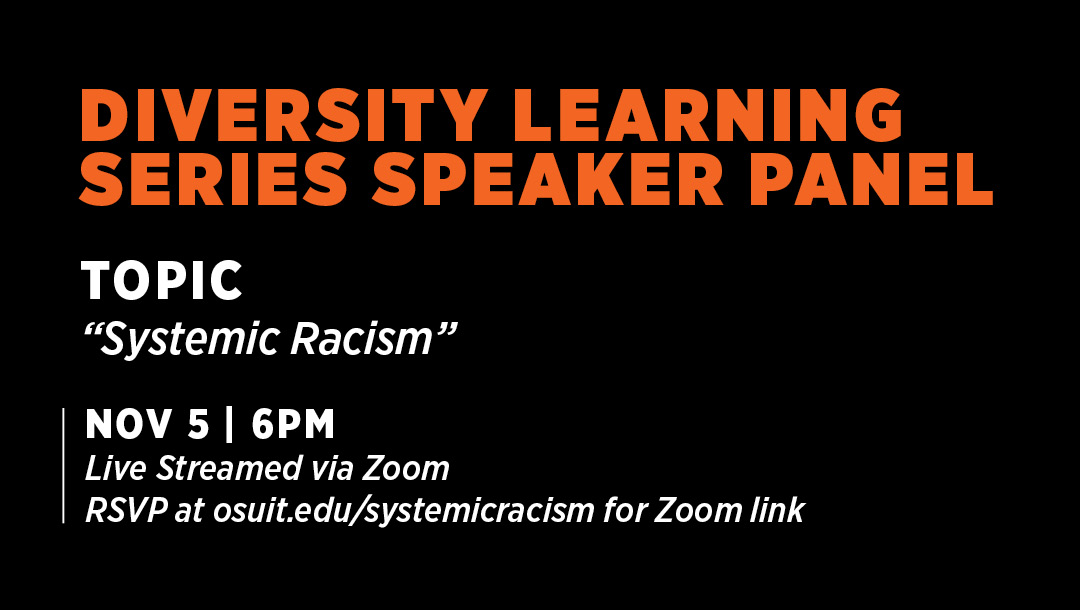
Systemic Racism will be discussed in a speaker panel format for the next event in the OSU Institute of Technology virtual Diversity Learning Series.
The OSUIT Diversity & Inclusion Committee is proud to welcome Bishop Frederick M. Brown, Jr., Ms. Jace Cuney DeCory and Nancy Mason on Nov. 5 at 6 p.m. via Zoom.
This is a free event available to all OSUIT students, faculty and staff. This panel discussion will last 90 minutes to accommodate time for each speaker.
“This topic was chosen because it is widely misunderstood,” said Dana Sterling, the Diversity & Inclusion Committee co-chair. “We are hoping that people can learn a little bit about the topic and take their understanding of racism in the United States beyond a definition of individual attitudes or emotions.”
The panelists will bring a wide variety of perspectives to this topic, from how systemic racism affects minority youth to its impact on Native Americans.
Bishop Brown, of Charlotte, North Carolina, is the founder and senior pastor of The Faith Center Church in Bluefield, West Virginia and Faith Center Church of Charlotte in Charlotte, North Carolina and the presiding bishop for the Communion of Covenant Ministries International.
Brown earned academic degrees from Marshall University, Huntington in West Virginia, Rhema Bible Training Center in Tulsa and Concord University, Athens, in West Virginia.
His previous ministerial positions include associate minister for the Love Center Christian Fellowship in Tulsa, associate pastor for the Harvest Outreach Center in West Virginia, associate pastor for Souls Harbor Ministries in Virginia and Director of the Full Gospel Bible Institute in Virginia.
Ms. Jace Cuney DeCory (Lakota/Oceti Sakowin/Cheyenne River Sioux Tribe) is Assistant Professor Emerita at Black Hills State University in South Dakota and retired in June 2017, after teaching American Indian Studies classes at BHSU for 33 years in the College of Liberal Arts.
She holds a B.A. in Anthropology/Concentration in American Indian Studies from the University of North Dakota, an M.Ed. from South Dakota State University, Brookings, in Counseling and Guidance and completed graduate work in Anthropology at the University of Washington in Seattle.
DeCory continues to give cultural presentations, and her interests lie in Lakota history, art, philosophy, American Indian women and cultural change. She credits Lakota elders for providing guidance, prayers and support throughout her life.
DeCory is a proponent of healthy lifestyles for Indigenous people and has developed health-related materials to inform and educate. She has given presentations at various health-related workshops, including traditional tobacco (cansasa) in Lakota society for ceremony and prayer. She was instrumental in developing a culture guide to assist folks working with American Indian people, entitled, Cultural Guide to American Indian Tribes in Montana and Wyoming, 2006, in her work a project export grant at BHSU.
Nancy Mason is the director of the Mvskoke Nation Youth Services program and a member of the Choctaw Nation. Mason specializes in positive youth development, person-centered planning, youth advisory boards, event planning, life skills implementation, group facilitation and strategic planning.
She obtained a Master of Human Relations degree from the University of Oklahoma. She has worked with youth and families since 1993 as a direct care staff, child welfare worker and program development specialist. Mason has assisted in developing the Native Pathways to Adulthood and the Presenting with Purpose curriculum for foster youth and service providers.
“We on the Diversity & Inclusion Committee have noticed that many people nowadays seem to think of racism as an attitude or emotion that individuals hold,” Sterling. “That is indeed an issue we face, but that definition is too limiting and obscures some important issues. If we think of racism as only operating on the personal level, one-on-one that allows us to ignore some crucial problems. This lives at a more institutional level; changing this situation requires more than an individual changing their attitudes, although that is also important.”
The committee is planning for the Diversity Learning Series to be a once a month event via Zoom. They anticipate the series will continue through the fall and spring semesters, at some point resuming in-person events.
For more information on each panelist or to RSVP, please visit the Diversity & Inclusion website page.
